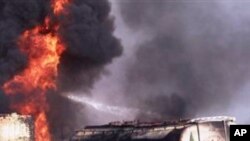Attacks on oil tankers and other supply vehicles heading through Pakistan on their way to replenish supplies to NATO troops in Afghanistan continue.
Have the attacks brought supply shortages to NATO troops in Afghanistan?
Brigadier General Josef Blotz, who leads the International Security Assistance Force in Afghanistan, says it is business as usual for his troops.
"This is very unfortunate, actually. I mean this is again violence. Blotz said "It is not really concerning in terms of logistics, supplies, etc for the ISAF operations. We do have plenty of supplies and stocks within Afghanistan. We do have access to transport and logistics through other border crossing points to Pakistan but also to neighboring countries in the north so there is no danger for the ongoing future ISAF operations."
Although the latest attack took place at a border crossing near the Pakistani town of Quetta, Pakistani authorities, last week blocked a supply truck crossing called the Torkham gate. That, they say, was done in retaliation for repeated incursions into their territory by NATO lead helicopters.
Blotz said he believed the blockade of the Torkham Gate would soon end, and added there are other ways to go
"Nobody knows for how long the Torkham Gate will be closed, actually", he said.. "I'm pretty confident that this will be not for a very long time and yes, we need to look for other options and the other options are, you know, getting in the necessary supplies and logistics through border crossing points with neighboring countries in the north.
The general added "We do have very important, very strong, border crossing points in Hairaton and in other places where we get in actually almost as much supplies as through the border crossing points with Pakistan, so there are alternatives."
The NATO lead International Security Assistance Force in Afghanistan is numbered at almost 120 thousand from 47 nations.




